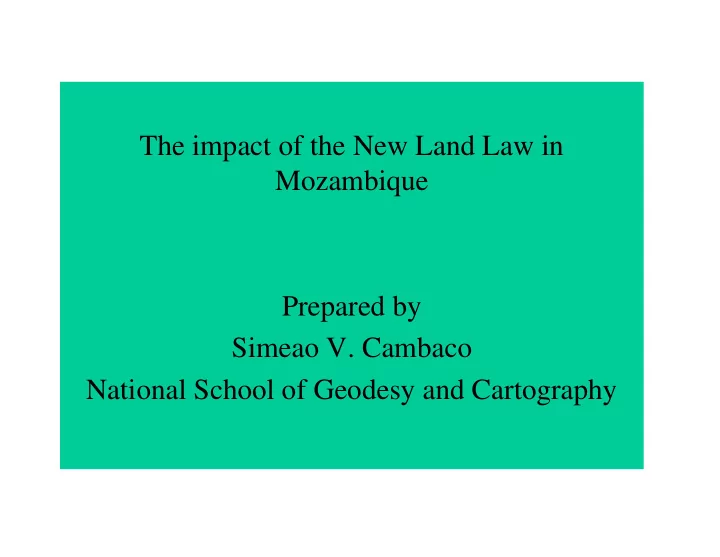

The impact of the New Land Law in Mozambique Prepared by Simeao V. Cambaco National School of Geodesy and Cartography
Background: Mozambique has: 799380 sqkm in area; About 18000000 inhabitants; About 36,1 million hectares of arable land adequate for agriculture About 40 million hectares of forestry of which 68% are covered with high value commercial species; About 56,1 million hectares for grazing; Declaration of nationalization of Land (Article 46 of Constitution of the Republic) according to which “Land belongs to the state and thus it cannot be sold or alienated”
Background(cont) � Land Law 6/79 of 1979 (+ regulation 16/87) • Reaffirms the ownership of land by the state (Article 1) • Grants rights of occupancy to any citizen • Cooperatives, state enterprises, state organisations • Frelimo Party • Enterprises • Small holders for agricultural purposes • Establishes 50 year lease for private enterprises (amendment by Law 1/86) No specific reference to foreign investment
Land Law 19/97 (+Regulation 66/98) • State ownership • use rights granted to: � Peasants (family sector smallholders) � Private individuals (nationals or foreigners) � Local communities � Enterprises.
How to access land Communities – by customary mechanisms National individuals: • By bona fide occupation for more than 10 years • By application to the relevant authorities • By inheritance Foreign Individuals: • By application provided they reside in the country for more than five (5) years If it is through companies, these must: • Be registered in Mozambique • Possess an investment project approved by the Mozambican Centre for the Investment Promotion With this satisfied, companies get a 50 year lease (renewable for similar periods)
Transmissibility(transfer) of Rights • By inheritance • Otherwise only infrastructures can be alienated between living persons in which case the transaction must be registered in the Notary (Justice Department) For rural lands if there is a large area surrounding the infrastructures, this area must be “disannexed” leaving enough for the purpose of infrastructures. • For urban land, this is transmitted together with the infrastructures contributing to their value. Mortgage: It is allowed to mortgage infrastructures or to use them as collaterals.
Extinction of Land Use Rights Rights can be cancelled when: • Not attaining the approved investment plan without plausible reasons • For overriding public interest whereby a compensation/indemnity is due • Lease term end • Giving up by the rights holder Eventual immovable capital assets become state owned
Taxes Taxes levied are determined according to: • Land location • Size of parcel • Purpose of the land These taxes are towards: • Authorization fee • Annual tax which can be increasing or decreasing depending on the investment made on the land Land occupation can be free of charge when: • State and its institutions owned
• Civil society organizations duly recognized by the government as non-lucrative • Family sector and local communities areas as well as those belonging to individuals citizens within those communities • National small scale farming cooperatives and associations
� � � Mozambique vis-à-vis region • Before country’s independence, land was owned by a handful of Portuguese colonists; • Original Mozambicans were landless; • Due to nationalization at Independence Day, land became state owned and hence: available for application by any citizen No need for compensation or expropriation No need for purchase, sufficing a well prepared application which is quite simplified;
Mozambique vis-a-vis region(cont) • Southern African countries land ownership in the hands of minorities; • States lacking cash to buy back land for redistribution; • Impatience of the people awaiting land allocation • Unrest in some of the countries leading to violent outcomes;
� Actual impact • Security of tenure for: smallholder family sector � Community land through delimitation at request or when there is a potential for dispute; • No application is approved before going to community consultation • Explicit foreign investment reference • Increasing taxation for very large areas so as to discourage accumulation of unused land;
Recommend
More recommend